- Home
- Milan Kundera
Ignorance Page 2
Ignorance Read online
Page 2
18
short: "I've got a friend who's a painter. She gave me two pictures as a gift. You can't imagine how beautiful they are!" In the third gallery she declared she wanted to see the Impressionists: "There's a permanent exhibition at the Jeu de Paume." "That's gone now," Irena said. "The Impressionists aren't at the Jeu de Paume anymore." "No, no," said the mother. "They are, they're at the Jeu de Paume. I know they are, and I'm not leaving Paris without seeing van Gogh!" Irena took her instead to the Musee Rodin. Standing in front of one of his statues, the mother sighed dreamily: "In Florence I saw Michelangelo's Davidl I was just speechless!" "Listen," Irena exploded. "You're here in Paris with me, and I'm showing you Rodin. Rodin! You hear? Rodin! You've never seen him, so why are you thinking about Michelangelo when you're right in front of Rodin?"
The question was fair: why, when she is reunited with her daughter after years, does the mother take no interest in what the younger woman is showing her and telling her? Why does Michelangelo, whom she saw with a group of Czech tourists, captivate her more than Rodin?
19
And why, through all these five days, does she not ask her daughter a single question? Not one question about her life, and none about France either—about its cuisine, its literature, its cheeses, its wines, its politics, its theaters, its films, its cars, its pianists, its cellists, its athletes?
Instead she talks constantly about goings-on in Prague, about Irena's half-brother (by her second husband, the one who just died), about other people, some Irena remembers and some she's never heard of. A couple of times she's tried to inject a remark about her life in France, but her words never penetrate the chinkless barrier of the mother's discourse.
That's how it had been ever since she was a child: the mother fussed over her son as if he were a little girl, but was manfully Spartan toward her daughter. Do I mean that she did not love her daughter? Perhaps because of Irena's father, her first husband, whom she had despised? We won't indulge in that sort of cheap psychologizing. Her behavior was very well intentioned: overflowing with energy and health herself, she worried over her daughter's low vitality; her rough style was meant to rid the daughter of her hypersensitivity, rather like an athletic father who throws his fear-
ful child into the swimming pool in the belief that this is the best way to teach him to swim.
And yet she was fully aware that her mere presence flattened her daughter, and I won't deny that she took a secret pleasure in her own physical superiority. So? What was she supposed to do? Vanish into thin air in the name of maternal love? She was growing inexorably older, and the sense of her strength as reflected in Irena's reaction had a rejuvenating effect on her. When she saw her daughter cowed and diminished at her side, she would prolong the occasions of her demolishing supremacy as long as possible. With sadistic zest, she would pretend to take Irena's fragility for indifference, laziness, indolence, and scolded her for it.
Irena had always felt less pretty and less intelligent in her mother's presence. How often had she run to the mirror for reassurance that she wasn't ugly, didn't look like an idiot. . . ? Oh, all that was so far away, almost forgotten. But during her mother's five-day stay in Paris, that feeling of inferiority, of weakness, of dependency came over her again.
6
The night before her mother left, Irena introduced her to her companion, Gustaf, a Swede. The three of them had dinner in a restaurant, and the mother, who spoke not a word of French, managed valiantly with English. Gustaf was delighted: with his mistress, Irena, he spoke only French, and he was tired of that language, which he considered pretentious and not very practical. That evening Irena did not talk much: she looked on in surprise as her mother displayed an unexpected capacity for interest in another person; with just her thirty badly pronounced English words she overwhelmed Gustaf with questions about his life, his business, his views, and she impressed him.
The next day her mother left. Back from the airport, and back to peace in her top-floor apartment, Irena went to the window,to savor the freedom of solitude. She gazed for a long while out at the rooftops, the array of chimneys with all their different fantastical shapes—the Parisian flora that had long ago supplanted the green of Czech gardens—and she realized how happy she was in
22
this city. She had always taken it as a given that emigrating was a misfortune. But, now she wonders, wasn't it instead an illusion of misfortune, an illusion suggested by the way people perceive an emigre? Wasn't she interpreting her own life according to the operating instructions other people had handed her? And she thought that even though it had been imposed from the outside and against her will, her emigration was perhaps, without her knowing it, the best outcome for her life. The implacable forces of history that had attacked her freedom had set her free.
So she was a little disconcerted a few weeks later when Gustaf proudly announced some good news: he had proposed that his firm open a Prague office. Since the Communist country had limited commercial appeal, the office would be a modest one; still, he would have occasion to spend time there now and then.
"I'm thrilled to have a connection with your city," he said.
Rather than delight, she felt some sort of vague threat.
"My city? Prague isn't my city anymore," she answered.
23
"What?" He bristled.
She had never disguised her views from him, so it was certainly possible for him to know her well, and yet he was seeing her exactly the way everyone else saw her: a young woman in pain, banished from her country. He himself comes from a Swedish town he wholeheartedly detests, and in which he refuses to set foot. But in his case it's taken for granted. Because everyone applauds him as a nice, very cosmopolitan Scandinavian who's already forgotten all about the place he comes from. Both of them are pigeonholed, labeled, and they will be judged by how true they are to their labels (of course, that and that alone is what's emphatically called "being true to oneself").
"What are you saying!" he protested. "Then what is your city?"
"Paris! This is where I met you, where I live with you."
As if he hadn't heard her, he stroked her hand: "Accept this as my gift to you. You can't go there. So I'll be your link to your lost country. I'm happy to do it!"
She did not doubt his goodness; she thanked
24
him; nonetheless she added, her tone even: "But please do understand that I don't need you to be my link with anything at all. I'm happy with you, cut off from everything and everyone."
He responded just as soberly: "I understand what you're saying. And don't worry that I expect to involve myself in your old life there. The only one I'll see of the people you used to know will be your mother."
What could she say? That her mother is exactly the person she doesn't want him spending time with? How could she tell him that—this man who remembers his own dead mother with such love?
"I admire your mother. What vitality!"
Irena has no doubt of that. Everyone admires her mother for her vitality. How can she explain to Gustaf that within the magic circle of maternal energy, Irena has never managed to rule over her own life? How can she explain that the constant proximity of the mother would throw her back, into her weaknesses, her immaturity? Oh, this insane idea of Gustaf s, wanting to connect with Prague!
Only when she was alone, back in the house, did she calm down, telling herself: "The police
25
barrier between the Communist countries and the West is pretty solid, thank God. I don't have to worry that Gustaf 's contacts with Prague could be any threat to me."
What? What was that she just said to herself? "The police barrier is pretty solid, thank God?" Did she really say, "Thank God?" Did she—an emigre everyone pities for losing her homeland— did she actually say, "Thank God?"
7
Gustaf had come to know Martin by chance, over a business negotiation. He met Irena much later, when she was already widowed. They liked each other
, but they were shy. Whereupon the husband hurried in from the beyond to help them along by being a ready subject for conversation. When Gustaf learned from Irena that Martin had been born the same year he was, he heard the collapse of the wall that separated him from this much-younger woman, and he felt a grateful affection for the dead man whose age encouraged him to court the man's beautiful wife.
Gustaf worshipped his deceased mother; he tolerated (without pleasure) two grown daughters; he was fleeing his wife. He would very much have liked to divorce if it could be done amicably. Since that was impossible, he did his best to stay away from Sweden. Like him, Irena had two daughters, who were also on the brink of living on their own. For the elder one Gustaf bought a studio apartment, and he arranged to send the younger one to a boarding school in England, so that Irena, living alone, could take him in.
She was dazzled by his goodness, which everyone saw as the main trait, the most striking, almost unbelievable trait of his character. He charmed women by it; they understood only too late that the goodness was less a weapon of seduction than a weapon of defense. His mother's darling boy, he was incapable of living on his own without women's caretaking. But he tolerated all the less well their demands, their arguments, their tears, and even their too-present, too-expansive bodies. To keep them around and at the same time avoid them, he would lob great artillery shells of goodness at them. Under cover of the smoke he would beat his retreat.
In the face of his goodness, Irena was at first
unsettled, confused: why was he so kind, so generous, so undemanding? How could she repay him? The only recompense she could figure out was to display her desire. She would set her wide-eyed gaze on him, a gaze that demanded some immense, intoxicating, nameless thing.
Her desire; the sad story of her desire. She had never known sexual pleasure before she met Martin. Then she bore a child, moved from Prague to France with a second daughter in her belly, and soon after that Martin was dead. She went through some long, hard years then, forced to take on any sort of work—cleaning houses, caring for a rich paraplegic—and it was a big triumph just to get the chance to do translations from Russian to French (she was glad to have studied languages seriously in Prague). The years rolled by, and on posters, on billboards, on the covers of magazines displayed on the newsstands, women stripped and couples kissed and men strutted in underpants, while amid the universal orgy her own body roamed the streets neglected and invisible.
So meeting Gustaf had been a festival. After such a long time, her body, her face were finally being seen and appreciated, and because they
28
were pleasing, a man had invited her to share life with him. It was in the midst of that enchantment that her mother turned up in Paris. But at perhaps that same time, or very slightly later, she began to harbor a vague suspicion that her body had not entirely escaped the fate it was apparently destined for all along. That Gustaf, who was fleeing his wife, his women, was looking to her not for an adventure, a new youth, a freedom of the senses, but for a rest. Let's not exaggerate; her body did not go untouched; but her suspicion grew that it was being touched less than it deserved.
8
Europe's Communism burned out exactly two hundred years after the French Revolution took fire. For Irena's Parisian friend Sylvie, that was a coincidence loaded with meaning. But with what meaning? What name could be given to the triumphal arch spanning those two majestic dates? The Arch of the Two Greatest European Revolu-
29
tions? Or The Arch Connecting the Greatest Revolution with the Final Restoration?'For the sake of avoiding ideological argument, I propose that we adopt a more modest interpretation: the first date gave birth to a great European character, the Emigre (either the Great Traitor or the Great Victim, according to one's outlook); the second date took the Emigre off the set of The History of the Europeans; with that, the great moviemaker of the collective unconscious finished off one of his most original productions, the emigration-dream show. And it was at this moment that Irena first returned to Prague for a few days.
When she set out it was very cold, and then after she had been there three days, summer arrived suddenly, unexpectedly, unseasonably. Her thick suit became unwearable. Having packed nothing for warmer weather, she went to a shop to buy a summer dress. The country was not yet overflowing with merchandise from the West, and all she found was the same fabrics, the same colors, the same styles she had known during the Communist period. She tried on two or three dresses and was uncomfortable. Hard to say why: they weren't ugly, their cut wasn't bad, but
30
they reminded her of her distant past, the sartorial austerity of her youth; they looked naive, provincial, inelegant, fit for a country schoolteacher. But she was in a hurry. Why, after all, shouldn't she look like a country schoolteacher for a few days? She bought the dress for a ridiculous price, kept it on, and with her winter suit in the bag stepped out into the hot street.
Then, walking by a big department store, she unexpectedly passed a wall covered with an enormous mirror and she was stunned: the person she saw was not she, it was somebody else or, when she looked longer at herself in her new dress, it was she but she living a different life, the life she would have lived if she had stayed in Prague. This woman was not dislikable, she was even touching, but a little too touching, touching to the point of tears, pitiable, poor, weak, downtrodden.
She was gripped by the same panic she used to feel in her emigration-dreams: through the magical power of a dress she could see herself imprisoned in a life she did not want and would never again be able to leave. As if long ago, at the start of her adult life, she had had a choice among several possible lives and had ended up choosing the
31
one that took her to France. And as if those other lives, rejected and abandoned, were still lying in wait for her and were jealously watching for her from their lairs. One of them had now snatched Irena and bound her into her new dress as if into a straitjacket.
Frightened, she hurried home to Gustaf's apartment (his company had bought a house in central Prague and he kept a pied-a-terre up under the eaves) and changed her clothes. Back in her winter suit now, she looked out the window. The sky was cloudy, and the trees bent under the wind. It had been hot for only a few hours. A few hours of heat to play a nightmare trick on her, to call up the horror of the return.
(Was it a dream? Her final emigration-dream? No, no, the whole thing today had been real. Still, she had the sense that the snares she knew from those early dreams were not done with—that they were still present, still at the ready, on the lookout for her.)
32
9
During the twenty years of Odysseus' absence, the people of Ithaca retained many recollections of him but never felt nostalgia for him. Whereas Odysseus did suffer nostalgia, and remembered almost nothing.
We can comprehend this curious contradiction if we realize that for memory to function well, it needs constant practice: if recollections are not evoked again and again, in conversations with friends, they go. Emigres gathered together in compatriot colonies keep retelling to the point of nausea the same stories, which thereby become unforgettable. But people who do not spend time with their compatriots, like Irena or Odysseus, are inevitably stricken with amnesia. The stronger their nostalgia, the emptier of recollections it becomes. The more Odysseus languished, the more he forgot. For nostalgia does not heighten memory's activity, it does not awaken recollections; it suffices unto itself, unto its own feelings, so fully absorbed is it by its suffering and nothing else.
33
After killing off the brazen fellows who hoped to marry Penelope and rule Ithaca, Odysseus was obliged to live with people he knew nothing about. To flatter him they would go over and over everything they could recall about him before he left for the war. And because they believed that all he was interested in was his Ithaca (how could they think otherwise, since he had journeyed over the immensity of the seas to get back to the place?), the
y nattered on about things that had happened during his absence, eager to answer any question he might have. Nothing bored him more. He was waiting for just one thing: for them finally to say "Tell us!" And that is the one thing they never said.
For twenty years he had thought about nothing but his return. But once he was back, he was amazed to realize that his life, the very essence of his life, its center, its treasure, lay outside Ithaca, in the twenty years of his wanderings. And this treasure he had lost, and could retrieve only by telling about it.
After leaving Calypso, during his return journey, he was shipwrecked in Phaeacia, whose king welcomed him to his court. There he was a for-
34
eigner, a mysterious stranger. A stranger gets asked "Who are you? Where do you come from? Tell us!" and he had told. For four long books of the Odyssey he had retraced in detail his adventures before the dazzled Phaeacians. But in Ithaca he was not a stranger, he was one of their own, so it never occurred to anyone to say, "Tell us!"
10
She leafed through her old address books, lingering over half-forgotten names; then she reserved a room at a restaurant. On a long table against the wall, alongside platters of petits fours, twelve bottles stood in neat rows. In Bohemia people don't drink good wine, and there is no custom of laying down vintage bottlings. She bought this old Bordeaux with all the greater pleasure: to surprise her guests, to make a party for them, to regain their friendship.
She came close to ruining it all. Awkwardly her friends eye the bottles until one of them, full of confidence and proud of her plain-and-simple
35
style, declares her preference for beer. Emboldened anew by this outspokenness, the others go along and the beer lover calls the waiter.
Irena blames herself for having committed an act of poor taste with her case of Bordeaux, for thoughtlessly underscoring everything that stands between them: her long absence from the country, her foreigner's ways, her wealth. She blames herself the more because the gathering is so important for her: she hopes finally to figure out whether she can live here, feel at home, have friends. So she determines not to let that bit of boorishness bother her, she is even willing to see it as a pleasing directness; after all, this beer her guests are so loyal to, isn't beer the holy libation of sincerity? the potion that dispels all hypocrisy, any charade of fine manners? the drink that does nothing worse than incite its fans to urinate in all innocence, to gain weight in all frankness? And in fact the women in the room are fullheartedly fat, they talk incessantly, overflow with good advice, and sing the praises of Gustaf, whose existence they all know about.

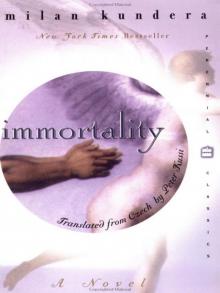 Immortality
Immortality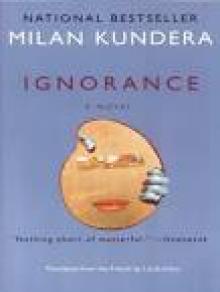 Dr. Havel After Twenty Years
Dr. Havel After Twenty Years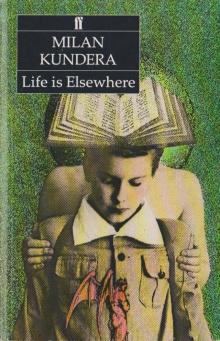 Life Is Elsewhere
Life Is Elsewhere Laughable Loves
Laughable Loves Symposium
Symposium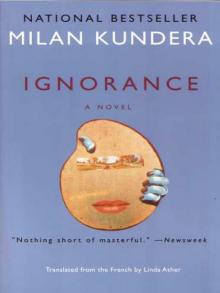 Ignorance
Ignorance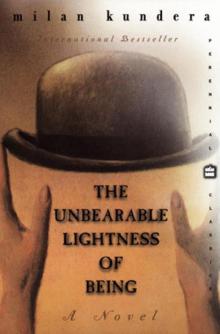 The Unbearable Lightness of Being
The Unbearable Lightness of Being Nobody Will Laugh
Nobody Will Laugh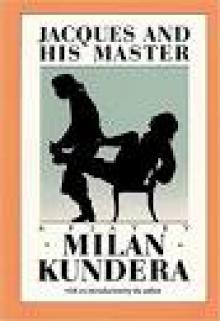 Jacques and His Master: An Homage to Diderot in Three Acts
Jacques and His Master: An Homage to Diderot in Three Acts The Golden Apple of Eternal Desire
The Golden Apple of Eternal Desire Eduard & God
Eduard & God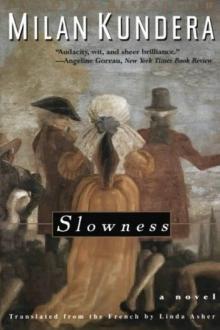 Slowness
Slowness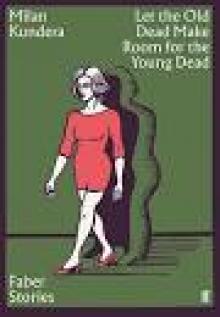 Let the Old Dead Make Room for the New Dead
Let the Old Dead Make Room for the New Dead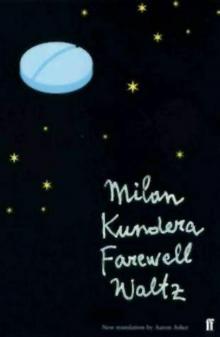 Farewell Waltz
Farewell Waltz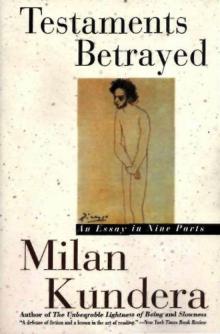 Testaments Betrayed: An Essay in Nine Parts
Testaments Betrayed: An Essay in Nine Parts